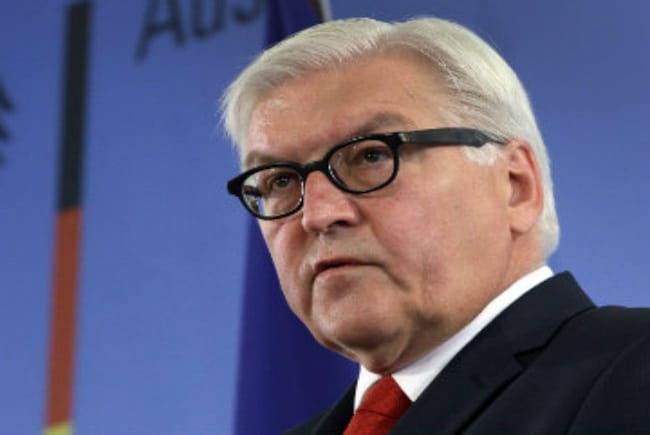
File Photo: German Foreign Frank-Walter Steinmeier (Associated Press)
Brussels:
The European Union (EU) promised today to boost political and economic support for Tunisia to ensure its transition to democracy was not derailed by last month's deadly attack on a tourist resort.
The attack on the resort of Sousse left 38 tourists dead, most of them British, and came just months after the deaths of 22 people in an attack on the Bardo Museum in the capital Tunis in March.
The Tunisian economy has been hit hard as several governments have now warned their nationals against visiting the country.
"There is a strong desire to support Tunisia in its efforts to make the transition to democracy and with its economy, especially tourism," EU foreign affairs head Federica Mogherini told Tunisian Prime Minister Habib Essidm after he met EU foreign ministers.
Mogherini said both sides were looking at border controls, preventing youth radicalisation and improving trade ties to help the economy, for example by increasing quotas for Tunisian olive oil and other products.
"We have shown our solidarity since (the pro-democracy protests of) 2011," Mogherini told reporters.
"We support reforms and we want to form a real partnership so that Tunisia remains a model for the future in the region," she said, referring to turmoil across North Africa and the Middle East.
The Tunisian premier said he was thankful for EU support but noted that after the euphoria of 2011, people were now demanding jobs which the authorities had so far not been able to produce.
The Sousse attack threatened the tourism sector which provided employment for 400,000 people plus another million in indirect jobs, he said.
The Tunisian central bank said in a recent report that visitor numbers tumbled nearly 26 percent in April just after the Bardo Museum attack, while at the same time, the government had to face up to the security challenge, the premier said.
"Some people are (unhappy) to see this transition and want to see it fail," he said. The Islamic State jihadist group has claimed responsibility for the Sousse attack.
"The EU and Tunisia agree to step up cooperation in the struggle against terrorism. The war will be long but it will be won, thanks to our friends," he said.
German Foreign Minister Frank-Walter Steinmeier said separately the attacks were meant to "hit the heart of the Tunisian economy," warning of the dangers from neighbouring Libya where rival factions are fighting for control.
The Sousse gunman is believed to have been trained in Libya for the attack.
"Border controls with Libya will be crucial in order to keep radical elements out," and Britain and France were ready to offer help on that front, Steinmeier said.
This can be done "bilaterally but as well by Europe as a whole."
He said Mogherini had a "mandate to explore how activities can be integrated in a common european mission. We will work on this in the coming days."
The attack on the resort of Sousse left 38 tourists dead, most of them British, and came just months after the deaths of 22 people in an attack on the Bardo Museum in the capital Tunis in March.
The Tunisian economy has been hit hard as several governments have now warned their nationals against visiting the country.
"There is a strong desire to support Tunisia in its efforts to make the transition to democracy and with its economy, especially tourism," EU foreign affairs head Federica Mogherini told Tunisian Prime Minister Habib Essidm after he met EU foreign ministers.
Mogherini said both sides were looking at border controls, preventing youth radicalisation and improving trade ties to help the economy, for example by increasing quotas for Tunisian olive oil and other products.
"We have shown our solidarity since (the pro-democracy protests of) 2011," Mogherini told reporters.
"We support reforms and we want to form a real partnership so that Tunisia remains a model for the future in the region," she said, referring to turmoil across North Africa and the Middle East.
The Tunisian premier said he was thankful for EU support but noted that after the euphoria of 2011, people were now demanding jobs which the authorities had so far not been able to produce.
The Sousse attack threatened the tourism sector which provided employment for 400,000 people plus another million in indirect jobs, he said.
The Tunisian central bank said in a recent report that visitor numbers tumbled nearly 26 percent in April just after the Bardo Museum attack, while at the same time, the government had to face up to the security challenge, the premier said.
"Some people are (unhappy) to see this transition and want to see it fail," he said. The Islamic State jihadist group has claimed responsibility for the Sousse attack.
"The EU and Tunisia agree to step up cooperation in the struggle against terrorism. The war will be long but it will be won, thanks to our friends," he said.
German Foreign Minister Frank-Walter Steinmeier said separately the attacks were meant to "hit the heart of the Tunisian economy," warning of the dangers from neighbouring Libya where rival factions are fighting for control.
The Sousse gunman is believed to have been trained in Libya for the attack.
"Border controls with Libya will be crucial in order to keep radical elements out," and Britain and France were ready to offer help on that front, Steinmeier said.
This can be done "bilaterally but as well by Europe as a whole."
He said Mogherini had a "mandate to explore how activities can be integrated in a common european mission. We will work on this in the coming days."
Track Latest News Live on NDTV.com and get news updates from India and around the world

